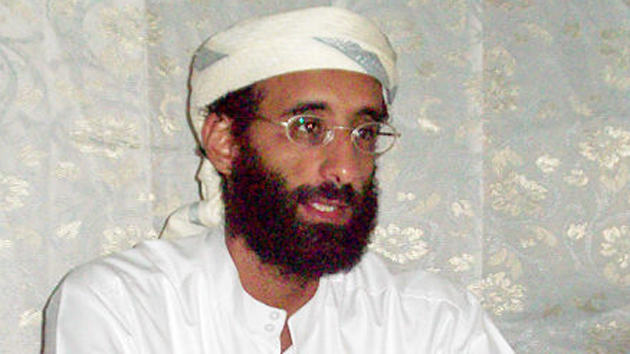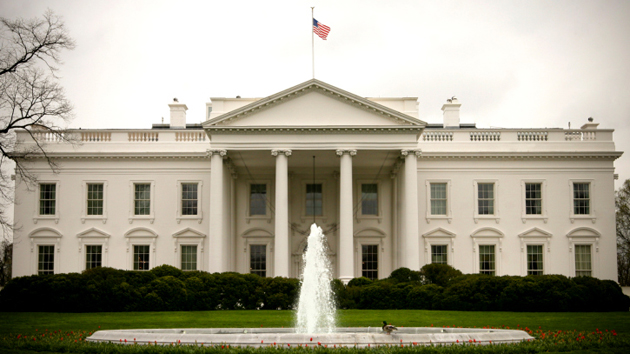
Anwar al-Awlaki, an American citizen killed by a drone strike in 2011.<a href="http://en.wikipedia.org/wiki/Anwar_al-Awlaki#mediaviewer/File:Anwar_al-Awlaki_sitting_on_couch,_lightened.jpg">Wikipedia</a>
This story first appeared on the TomDispatch website.
You can’t get more serious about protecting the people from their government than the Fifth Amendment to the Constitution, specifically in its most critical clause: “No person shall be… deprived of life, liberty, or property, without due process of law.” In 2011, the White House ordered the drone-killing of American citizen Anwar al-Awlaki without trial. It claimed this was a legal act it is prepared to repeat as necessary. Given the Fifth Amendment, how exactly was this justified? Thanks to a much contested, recently released but significantly redacted—about one-third of the text is missing—Justice Department white paper providing the basis for that extrajudicial killing, we finally know: the president in Post-Constitutional America is now officially judge, jury, and executioner.

Due Process in Constitutional America
Looking back on the violations of justice that characterized British rule in pre-Constitutional America, it is easy to see the Founders’ intent in creating the Fifth Amendment. A government’s ability to inflict harm on its people, whether by taking their lives, imprisoning them, or confiscating their property, was to be checked by due process.
Due process is the only requirement of government that is stated twice in the Constitution, signaling its importance. The Fifth Amendment imposed the due process requirement on the federal government, while the Fourteenth Amendment did the same for the states. Both offer a crucial promise to the people that fair procedures will remain available to challenge government actions. The broader concept of due process goes all the way back to the thirteenth-century Magna Carta.
Due process, as refined over the years by the Supreme Court, came to take two forms in Constitutional America. The first was procedural due process: people threatened by government actions that might potentially take away life, liberty, or possessions would have the right to defend themselves from a power that sought, whether for good reasons or bad, to deprive them of something important. American citizens were guaranteed their proverbial “day in court.”
The second type, substantive due process, was codified in 1938 to protect those rights so fundamental that they are implicit in liberty itself, even when not spelled out explicitly in the Constitution. Had the concept been in place at the time, a ready example would have been slavery. Though not specifically prohibited by the Constitution, it was on its face an affront to democracy. No court process could possibly have made slavery fair. The same held, for instance, for the “right” to an education, to have children, and so forth. Substantive due process is often invoked by supporters of same-sex unions, who assert that there is a fundamental right to marry. The meaning is crystal clear: there is an inherent, moral sense of “due process” applicable to government actions against any citizen and it cannot be done away with legally. Any law that attempts to interfere with such rights is inherently unconstitutional.
Al-Awlaki’s Death
On September 30, 2011, on the order of the president, a US drone fired a missile in Yemen and killed Anwar al-Awlaki. A Northern Virginia Islamic cleric, in the aftermath of 9/11 he had been invited to lunch at the Pentagon as part of a program to create ties to Muslim moderates. After he moved to Yemen a few years later, the US accused him of working with al-Qaeda as a propagandist who may have played an online role in persuading others to join the cause. (He was allegedly linked to the “Underwear Bomber” and the Fort Hood shooter.) However, no one has ever accused him of pulling a trigger or setting off a bomb, deeds that might, in court, rise to the level of a capital crime. Al-Awlaki held a set of beliefs and talked about them. For that he was executed without trial.
 In March 2012, Attorney General Eric Holder made quite a remarkable statement about the al-Awlaki killing. He claimed “that a careful and thorough executive branch review of the facts in a case amounts to ‘due process’ and that the Constitution’s Fifth Amendment protection against depriving a citizen of his or her life without due process of law does not mandate a ‘judicial process.'” In other words, according to the top legal authority in the nation, a White House review was due process enough when it came to an American citizen with al-Qaeda sympathies. In this, though it was unknown at the time, Holder was essentially quoting a secret white paper on that killing produced by the Office of Legal Counsel, located in the department he headed.
In March 2012, Attorney General Eric Holder made quite a remarkable statement about the al-Awlaki killing. He claimed “that a careful and thorough executive branch review of the facts in a case amounts to ‘due process’ and that the Constitution’s Fifth Amendment protection against depriving a citizen of his or her life without due process of law does not mandate a ‘judicial process.'” In other words, according to the top legal authority in the nation, a White House review was due process enough when it came to an American citizen with al-Qaeda sympathies. In this, though it was unknown at the time, Holder was essentially quoting a secret white paper on that killing produced by the Office of Legal Counsel, located in the department he headed.
In June 2014, after a long court battle to shield the underlying legal basis for the killing, the Obama administration finally released a redacted version of that classified 2010 white paper. In the end, it did so only because without its release key senators were reluctant to confirm the memo’s author, David Barron, who had been nominated by President Obama to serve on the First Circuit Court of Appeals. (Once it was made public, Barron was indeed confirmed.)
The importance of the white paper to understanding Post-Constitutional America cannot be understated. Despite all the unconstitutional actions taken by the government since 9/11—including striking violations of the Fourth Amendment—this paper is to date the only glimpse we have of the kind of thinking that has gone into Washington’s violations of the Bill of Rights.
Here’s the terrifying part: ostensibly the result of some of the best legal thinking available to the White House on a issue that couldn’t be more basic to the American system, it wouldn’t get a first-year law student a C-. The arguments are almost bizarrely puerile in a document that is a visibly shaky attempt to provide cover for a pre-determined premise. No wonder the administration fought its release for so long. Its officials were, undoubtedly, ashamed of it. Let’s drill down.
Death by Pen
For the killing of an American citizen to be legal, the document claims, you need one essential thing: “an informed, high-level official of the US government [who] has determined that the targeted individual poses an imminent threat of violent attack against the United States.” In addition, capture must be found to be unfeasible and the act of killing must follow the existing laws of war, which means drones are okay but poison gas is a no-no.
The rest of the justification in the white paper flows from that premise in a perverse chain of ankle-bone-connected-to-the-leg-bone logic: the president has the obligation to protect America; al-Qaeda is a threat; Congress authorized war against it; and being in al-Qaeda is more relevant than citizenship (or as the document crudely puts it, “citizenship does not immunize the target”). International borders and the sovereignty of other nations are not issues if the US determines the host nation is “unwilling or unable to suppress the threat posed by the individual targeted.” Basically, it’s all an extension of the idea of self-defense, with more than a dash of convenience shaken in.
When the white paper addresses the Fifth Amendment’s right to due process, and to a lesser extent, the Fourth Amendment’s right against unwarranted seizure (that is, the taking of a life), it dismisses them via the “balancing test.” Not exactly bedrock constitutional material, it works this way: in situations where the government’s interest overshadows an individual’s interest, and the individual’s interest isn’t that big a deal to begin with, and a mistake by the government can later be undone, the full due process clause of the Fifth Amendment need not come into play.
The three-point balancing test cited by the white paper as conclusive enough to justify the extrajudicial killing of an American comes from a 1976 Supreme Court case, Mathews v. Eldridge. There, the court held that an individual denied Social Security benefits had a right to some form of due process, but not necessarily full-blown hearings. In Anwar al-Awlaki’s case, this translates into some truly dubious logic: the government’s interest in protecting Americans overshadows one citizen’s interest in staying alive. Somehow, the desire to stay alive doesn’t count for much because al-Awlaki belonged to al-Qaeda and was in the backlands of Yemen, which meant that he was not conveniently available by capture for a trial date. Admittedly, there’s no undoing death in a drone killing, but so what.
The white paper also draws heavily on the use of the balancing test in the case of Hamdi v. Rumsfeld, in which the US rendered from Afghanistan Yaser Hamdi, a Saudi-American citizen, and sought to detain him indefinitely without trial. After a long legal battle that went to the Supreme Court, the balance test was applied to limit—but not fully do away with—due process. Despite limiting Hamdi’s rights in service to the war on terror, the court was clear: Yaser Hamdi should have a meaningful opportunity to challenge his status. Fearing that giving him his moment in court would expose the brutal reality of his capture, interrogation, and detention, the US government instead released him to Saudi Arabia.
Hamdi’s case dealt with procedural questions, such as whether he should be allowed a trial and if so, under what conditions. As with Mathews v. Eldridge, Hamdi never focused on issues of life and death. Cases can be (re)tried, prisoners released, property returned. Dead is dead—in the case of al-Awlaki that applies to the drone’s target, the balance test, and the Fifth Amendment itself.
What Do Words Mean in Post-Constitutional America?
Having dispensed with significant constitutional issues thanks to some exceedingly dubious logic, the white paper returns to its basic premise: that a kill is legal when that “informed, high-level official” determines that an “imminent threat” to the country is involved. In other words, if the president is convinced, based on whatever proof is provided, he can order an American citizen killed. The white paper doesn’t commit itself on how far down the chain of “high-level officials” kill authority can be delegated. Could the Secretary of the Interior, for instance, issue such an order? He or she is, after all, eighth in the line of succession should the president die in office.
The white paper does, however, spend a fair amount of time explaining how the dictionary definitions of “imminent” and “immediate” do not apply. For kill purposes, it says, the US must have “clear evidence that a specific attack on US persons will take place in the immediate future.” However, the paper goes on to explain that “immediate” can include a situation like al-Awlaki’s in which a person may or may not have been engaged in planning actual attacks that might not be launched for years, or perhaps ever. The paper claims that, since al-Qaeda would prefer to attack the US on a continual basis, any planning or forethought today, however fantastical or future-oriented, constitutes an “imminent” attack that requires sending in the drones.
And if, as perhaps the author of the paper suspected, that isn’t really enough when faced with the bluntness of the Constitution on the issue, the white paper haphazardly draws on the public authority justification. According to this legal concept, public authorities can, in rare circumstances, violate the law —a cop can justifiably kill a bad guy under certain conditions. By extension, the white paper argues, the government of the United States can drone-kill a citizen who is allegedly a member of al-Qaeda. The white paper conveniently doesn’t mention that police shootings are subject to judicial review, and those who commit such unlawful acts can face punishment. The laws behind such a review are unclassified and public, not the rationed fodder of a redacted white paper.
For the final nail in the coffin of some American citizen, the white paper concludes that, Fifth Amendment violation or not, its arguments cannot be challenged in court. In cases of “foreign policy,” courts have traditionally almost always refused to intervene, holding that they are in the realm of the executive branch in consultation, as required, with Congress. Killing an American abroad, the white paper insists, is a foreign policy act and so none of any courts’ business.
Principles
Substantive due process legally applies only to legislation, and it is highly unlikely that the Obama administration will seek legislative sanction for its kill process. So it is in one sense not surprising that the white paper makes no mention of it. However, looking at what we can read of that redacted document through the broader lens of substantive due process does tell us a lot about Post-Constitutional America. In Constitutional America, the idea was that a citizen’s right to life and the due process that went with it was essentially an ultimate principle that trumped all others, no matter how bad or evil that person might be. What is important in the white paper is not so much what is there, but what is missing: a fundamental sense of justness.
As medieval kings invoked church sanction to justify evil deeds, so in our modern world lawyers are mobilized to transform government actions that spit in the face of substantive due process—torture, indefinite detention without charge, murder—into something “legal.” Torture morphs into acceptable enhanced interrogation techniques, indefinite detention acquires a quasi-legal stance with the faux-justice of military tribunals, and the convenient murder of a citizen is turned into an act of “self-defense.” However unpalatable Anwar al-Awlaki’s words passed on via the Internet may have been, they would be unlikely to constitute a capital crime in a US court. His killing violated the Fifth Amendment both procedurally and substantively.
Despite its gravity, once the white paper was pried loose from the White House few seemed to care what it said. Even the New York Times, which had fought in court alongside the ACLU to have it released, could only bring itself to editorialize mildly that the document offered “little confidence that the lethal action was taken with real care” and suggest that the rubber-stamp secret Foreign Intelligence Surveillance Court be involved in future kill orders. The ACLU’s comments focused mostly on the need for more documentation on the kills. Meanwhile, a majority of Americans, 52%, approve of drone strikes, likely including the one on Anwar al-Awlaki.
The Kind of Country We Live In
We have fallen from a high place. Dark things have been done. Imagine, pre-9/11, the uproar if we had learned that the first President Bush had directed the NSA to sweep up all America’s communications without warrant, or if Bill Clinton had created a secret framework to kill American citizens without trial. Yet such actions over the course of two administrations are now accepted as almost routine, and entangled in platitudes falsely framing the debate as one between “security” and “freedom.” I suspect that, if they could bring themselves to a moment of genuine honesty, the government officials involved in creating Post-Constitutional America would say that they really never imagined it would be so easy.
In one sense, America the Homeland has become the most significant battleground in the war on terror. No, not in the numbers of those killed or maimed, but in the broad totality of what has been lost to us for no gain. It is worth remembering that, in pre-Constitutional America, a powerful executive—the king—ruled with indifference to the people. With the Constitution, we became a nation, in spirit if not always in practice, based on a common set of values, our Bill of Rights. When you take that away, we here in Post-Constitutional America are just a trailer park of strangers.
Peter Van Buren blew the whistle on State Department waste and mismanagement during the Iraqi reconstruction in his first book, We Meant Well: How I Helped Lose the Battle for the Hearts and Minds of the Iraqi People. A Tom Dispatch regular, he writes about current events at his blog, We Meant Well. His new book, Ghosts of Tom Joad: A Story of the #99Percent, is available now. To stay on top of important articles like these, sign up to receive the latest updates from TomDispatch.com here.

















